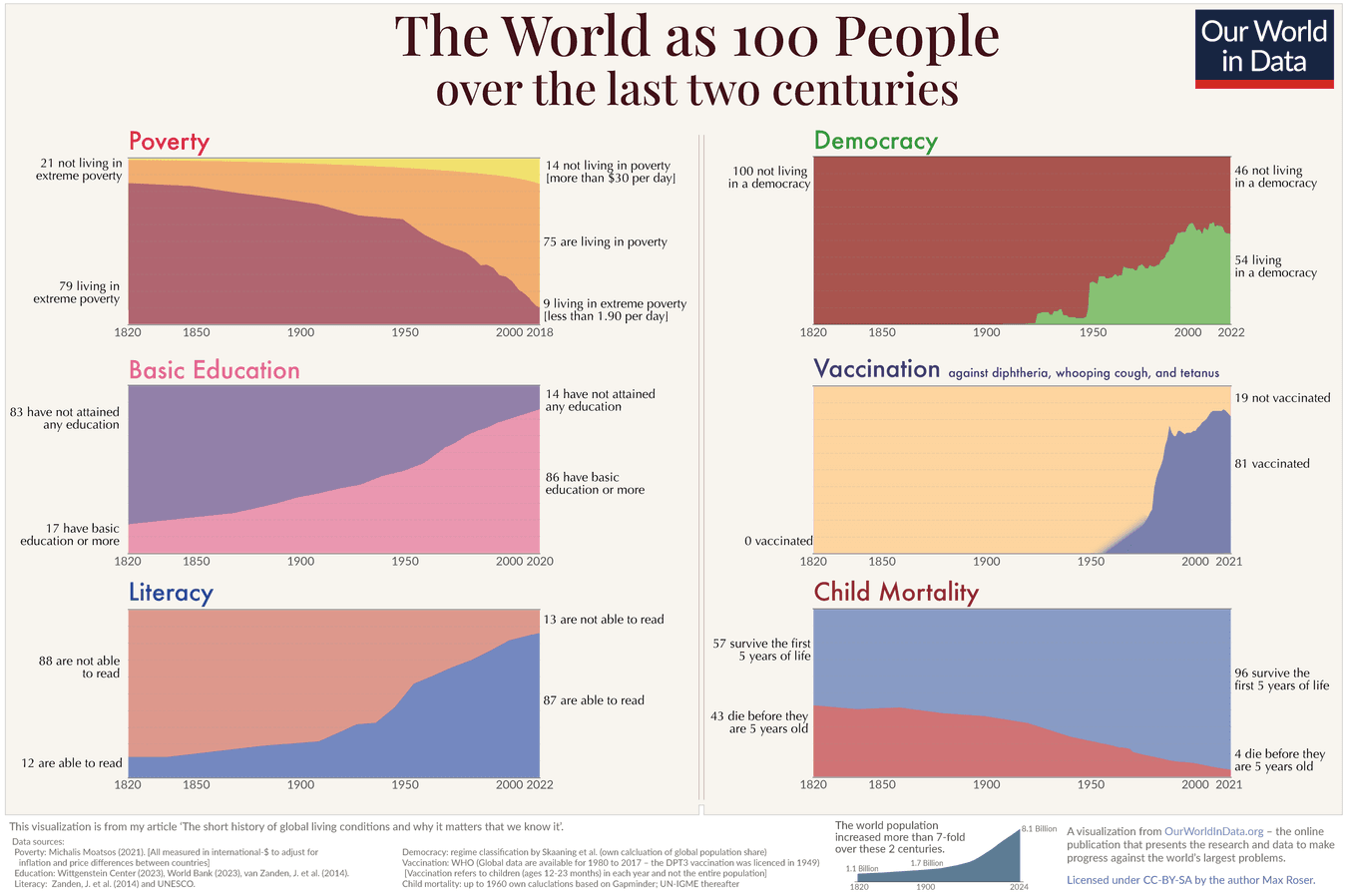Is there a better way to talk about sustainability?


Here we go. Another environmental sustainability article that’s going to fill us with existential dread and powerlessness. mmm no thanks!
Understandable right? It’s probably par for the course to be a little jaded with all the sustainability stuff that we’re being bombarded with on the internet. There’s so much sanctimony, name calling, finger pointing, partisanship and doomsaying that we find ourselves just throwing our hands up in exasperation.
What’s the point even? It’s just depressing!
It doesn’t need to be though.
There seems to be this popular notion floating about that things have never been as bad as they are today.
Are we sure about this?
Forget about arriving at some overarching, comprehensive conclusion that takes ALL the variables into account - if that’s even possible - but if we only looked around us and compared our lives to that of our grandparents or great-grandparents, there’s a lot to be thankful for.
Smallpox - I mean, think about it - that couldn’t have been fun!
There’s so much pessimism and maybe worse - so much certainty about the fact that things have never been worse - which is probably not true, all things considered.
Make no mistake, we ARE up against some pretty monumental challenges - the battery waste crisis, soil pollution, deforestation, mass extinctions - you name it!
but it’s not all bad - we’ve given a good account of ourselves with a lot of stuff - more people than ever before have access to education, wealth, personal safety and social opportunities. We have the internet! Woohoo!
We’ve created a world where people from one country can move to another without necessarily being attacked for looking different.
Where are you going with all this?
What we’re getting at is this - do conversations around sustainability and ecology necessarily have to be the kind that cause jaded resignment?
Is there a better way to talk about these topics?
Could we frame these collective issues in a better way? In a way that actually allows for more creativity, positivity and solutions - rather than negativity, pessimism, anxiety and divisiveness?
Not The Worst Times
As we mentioned earlier, a lot of things are working well in today’s world - we really need to get to terms with this fact. The statistics bear this out as well - maybe this idea comes from a very myopic perspective - one not informed by a study of history perhaps.
If only we flipped through the pages of history and saw how hopeless we were for most of our history - what with wars, famines, diseases and poverty - we wouldn’t be quite so certain in dismissing the modern world so completely; for all its problems, it does have a lot going for itself.
Why are we stuck on this point?
Because this is probably one of the most significant underlying reasons for our negativity and pessimism around topics of sustainability - that we think we are the only generation of people to have ever faced huge challenges in the world.
That’s simply not true.
Living on this planet has always been a tenuous, scary and precariously uncertain proposition - if anything, more so in the past than today.
Maybe we just have access to a lot more information on a global scale than people did in the past - maybe this creates the illusion that there’s something wrong all the time. Our nervous systems are always in a state of panic - high alert!
And then no wonder we make these dreadful conclusions about these “terrible” times that we live in - as if it was a foregone conclusion that we’re the most unlucky generation of people ever to roam the face of earth.
This can’t be coming as a surprise to anyone though - Come on - we’re pretty negativity biased as individuals - it would only stand to reason that we’d be negativity biased as a collective as well.
See, the thing is - the human nervous system is designed in a way to prioritise negatively valenced stimuli, information and feedback over positive ones.
Why is that, you ask?
Well, to flog an already overworked cliche - picture our prehistoric ancestors - the ones who were the most la-di-da just weren’t as good at survival as the ones who were super sensitive to paranoia about getting mauled to death by a sabertooth tiger -
We’re oversimplifying - but you get the gist.
This negative bias exists to help us survive. The pain caused by unfavourable situations and outcomes outweighs the pleasure caused by positive situations and outcomes - this helps us survive.
Dr.Jordan Peterson expresses the same sentiment rather succinctly when he says
“well it’s because you can be absolutely dead and you can only be so happy”
OK now,
Back to the matter at hand….
The facts seem to suggest that we’re miles ahead of any other group of people to have inhabited this planet across a whole bunch of metrics.
And yet, we’re all so doom and gloom about things.
See, we’re not naive optimists. Like we mentioned earlier, it IS true that we are up against some pretty TITANIC challenges that we’ll have to find some immediate answers to if we intend to keep this party going.
But that doesn’t call for doom and gloom, does it?
Urgency? Yes, for sure.
Global cooperation, common sense, collective responsibility - yes, yes, yes - all of that!
But not doom and gloom!
Doom and gloom isn’t going to help us. Innovating might help us. Sharing ideas might help us. But collective despair isn’t going to take us very far unfortunately.
There might even be a case to make that all this chaos that we’re unfurling on the planet is down to us feeling so crummy and trying to make ourselves feel better with more stuff.
Granted, that’s a wild oversimplification but it’s not entirely without credence.
Our overconsumption is a coping mechanism for all sorts of negativity. If anything, more doomsday prophesying is only going to make our problems worse.
The cheerful, optimistic case for sustainability
Look, we’re making a mess of the planet.
There’s no two ways about that. We simply have to face the facts. Whether we like it or not, we’re being faced with some pretty big challenges that are not simply going to disappear.
But here’s the thing.
Can we be more optimistic with it?
Can we bring a sense of lightness to it?
Hey - we’re just asking questions here. We’re no experts. But this is what we think.
We do need to talk about this stuff. The more we talk about this stuff, the more our chances of actually being able to come up with powerful solutions.
And make no mistake, we do need to do more than talk as well. More people talking about sustainability is good but that isn’t enough in itself.
We need to take action.
We need to implement real changes to the way we do things. Change our collective habits. Come up with new ways of doing things.
None of this is optional. None of this can be wished away.
But again, none of this is cause for doom and gloom. Seriousness isn’t going to solve the problem.
In fact, it might just do the opposite.
It might create so much subconscious resistance and fear in us that we choose to ignore these problems altogether. That would be a proper disaster.
In fact that’s already what’s going on in many ways.
For many of us, sustainability is a pet issue that we love to talk about.
We love talking about it, making noise around it and pointing fingers at those we think are responsible.
But then, we go back to our usual ways - overconsumption, apathy and haphazardness.
This is not helping the planet.
And, it definitely isn’t helping us.
Here’s an alternative.
What if we reverse the equation?
What if we replace doom and gloom with cheerful optimism - and replace the apathy and overconsumption with concerted action, mindful consumption and more environmentally sensible behaviour?
Doesn’t that just immediately sound like a better way of going about things?
And it’s not just a psychological hack either - in spite of all the negativity around the topic, there is actually quite a lot of reason to cheer.
Contrary to the narrative that the world is falling apart, there is actually quite a bit of evidence to suggest the contrary - we are seeing a massive uptick in various measures of human wellness.
Take a look at the infographic below for instance - it’s very telling - we’ve never done better than we are doing right now in terms of wealth, education or health.
But you might say - “hey! but those are not sustainability markers”
Fair enough - but worries about sustainability are just a tiny bit downstream from worries about the state of the world overall - we tend to be pessimistic about current issues - this makes it difficult for us to see these challenges in the right context.
We tend to forget that life on earth has always been rife with challenging situations and things have actually never been better.

Looking Ahead
These are exciting times to live in.
Modern technology allows us to come together, globally, like never before.
The challenges we are faced with are daunting - but our capabilities are pretty incredible too.
Let’s replace pessimism with resolute grit. Apathy with urgency. Despair with focused action and worry with relentless cheer.
Relax. We got this!












